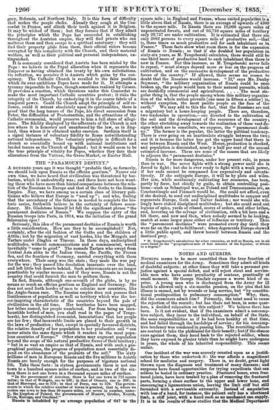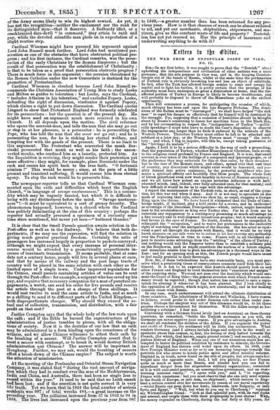NOTES AND QUERIES.
NOTRING seems to be more unsettled than the true function of medical examiners for the Army. Sometimes they admit all kinds of doubtful subjects; at other times they will take a personal pre- judice against a special defect, and will reject stout and service- able men who have some peculiarity of contour, practically of small moment. Sir George Sinclair exposes a worse kind of ca- price. A young man who is discharged from the Army for ill health is allowed only a six-months pension, on the plea that his illness is caused, not by wounds or long service, but "by constitu- tional predisposition to pulmonary consumption." Why, then,. did the examiners admit him ? Formerly, the taint used to cause the rejection of the recruit ; but has there not been, in some quar- ters, a decided relaxation on this subject ? We believe there has been. Is it not evident, that if the examiners admit a consump- tive subject, they incur to the individual, on behalf of the State, the same responsibilities as if he had been healthy at that time, and had failed through the hardships of service ; for his consump- tive tendency was condoned in passing him. The recruiting-officers are content to take the phthisical for their benefit; but if the chance runs against them, they hand back to the rejected soldier, whom they have exposed to greater trials than he might have undergone in peace, the whole of his inherited responsibility. This seems unfair.
One incident of the war was scarcely counted upon as a justifi- cation by those who undertook it: the war affords a magnificent school for medicine and surgery. There is, no doubt, great light thrown upon the diagnosis and treatment of many diseases ; and surgeons have found opportunities for trying expedients that can seldom be tested in ordinary practice. Fractured bones, even frao- tured joints, have been treated by a plan of removing the fractured parts, forming a clean surface to the upper and lower bone, and encouraging a ligamentous union, leaving the limb stiff but stall furnished with a serviceable extremity. Instead of amputation with loss of a hand, for instance, the patient only has a shortened limb, a stiff joint, with a hand such as no mechanist tan supply. It is in the results of these studies that the Medical Department of the Army seems likely to win its highest toward. As yet, it has not the recognition—neither the emolument nor the rank for its distinguished men—that it deserves. A foolhardy idiot, or a crackbrained dare-devil "in command," may attain to rank and pay, while the devoted scientific man plods on in expectation of a slight routine step.
Cardinal Wiseman might have pursued his argument against Lord John Russell much further. Lord John had mentioned per- secution as one of the obstacles that have obstructed political pro- gress; and his first instance, the Cardinal remarks, was the perse- cution of the early Christians by the Roman Emperors ; but the result of that persecution was the establishment of Christianity : is that to be taken as a proof that persecution obstructs progress ? There is much force in this argument: the coercion threatened by the Roman Catholics under the new Concordats is destined for the promotion of Protestantism.
Cardinal Wiseman is shocked because Lord john Russell re- commends the Christian Association of Young Men to study Locke and Milton as guides to toleration : but Locke, says the Cardinal, "includes Atheism in his toleration," and excludes Popery. Locke, defending the right of discussion, vindicates it against Popery, which claims a right to put down discussion. The Cardinal quotes Lingard to show that Protestant England was formerly celebrated for its persecutions : but the question is of the present day. He might have used an argument much more received in his own Church. It all depends upon the motive. - The civil reformer who opens the convent-door, and tells the nun that she may go out or stop in at her pleasure, is a persecutor : he is persecuting the Pope, who has told the nun that she must not go out ; and he is persecuting the nun, for he is risking her eternal welfare, and tempting her with the gands of the present. There is no limit to this argument. The Protestant who converted the monk Bor. zinski persecuted that monk as well as his faith ; the uncon- verted monks, who confined him as a lunatic, protected him. As the Inquisition is reviving, they might render their protection yet more effective they might, for example, place Borzinski under the rack and coerce his spirit back to the true faith. "0 fortunati nimium !" This would be mercy ; since, at the pain of a little present and transient suffering, it would rescue him from eternal agony. To stop the rack would be to persecute him.
The newspaper-reporter tells us that Cardinal Wiseman com- mented upon the evils and difficulties which beset the English Church, "in language of savage unctuousness." This is a commo- dity which may be vaguely fancied, but which it is difficult to bring with any distinctness before the mind. "Savage unctuous- ness '9—it must be equivalent to a sort of greasy ferocity. The phenomenon happened, however, in a church where the Cardinal was politely fulminating at the sins of this country : perhaps the reporter had actually procured a specimen of a curiosity some time since mentioned, but never yet tieen—" buttered thunder."
It is clear that the Small Parcels question awaits solution in the Post-offiee as well as in the Railway. We believe that both de. partments, if we may use the expression, will find the solution in giving much greater practical freedom. Certainly the ratio of passengers has increased largely in proportion to packets conveyed; although we might expect that every increase of personal inter- course would be attended by a geometrically proportionate in- crease of inanimate transmission. It seems probable, that at some data not a century hence, people will live in several places at once, and that by means of the railway and the post large tracts of country will be placed in the same relation with each other as the limited space of a single town. Under improved regulations for the Crimea, small parcels containing articles of value can be sent through the Post-office: for example, a sergeant who has saved up his pay, and requires that necessary companion fora man of punctual en- gagements, a watch, can send his order for five pounds and receive the article through the post at a charge of three shillings. It would cost twelve to send the same article to India, and as much as a shilling to send it to different parts of the United Kingdom,— both disproportionate charges. Why should they exceed the ac- tual cost of collection, transmission, and distribution, with a fair profit on that cost ?
Justice Cram pton says that the whole body of the law rests upon the oath ; and if the Bible be burned the superstructure of the administration of justice tumbles to pieces, with all the obliga- tions of society. Now it is the doctrine of our law that an oath may be administered in a form binding upon the conscience of the witness, and we allow Chinese witnesses to attest their oath by the breaking of a saucer. Will Tustice Crampton assert that to treat a saucer with contempt, or to break it, would destroy British administration qua Chinese ? The answer will be important in Hongkong. Further, we may ask, would the breaking of saucers effect a break-down of the Chinese empire ? The subject is worth the attention of missionaries.
At the meeting of the Peninsular and Oriental Steam Navigation Company, it was stated that "during the vast amount of naviga- tion which they had to conduct over the seas of the Mediterranean, India and China, and Australia, there had been no single loss to record within the year." It used to be said that no Leith smack had been lost ; and if the assertion is not quite correct it is very Re truth. Yet we learn that in 1854 the total number of serious accidents was 987; of total wrecks 484,—a great increase on the preceding year. The collisions increased from 57 in-1852 to 94 in 1854. The lives lost increased upon the previous year from 987 to l549,—a greater number than has been returned for any pre- . vions year. How is it that chances of wreck can be almost reduced to nil, and yet our merchants, shipbuilders, shipowners, and ma- riners, give He this constant waste of life and property ? Teetotal- ism has not yet rescued us. Has the principle of insurance and underwriting anything to do with it?



































 Previous page
Previous page